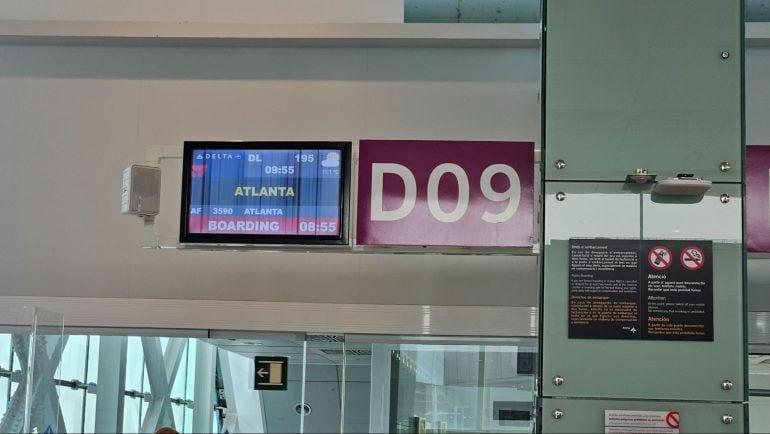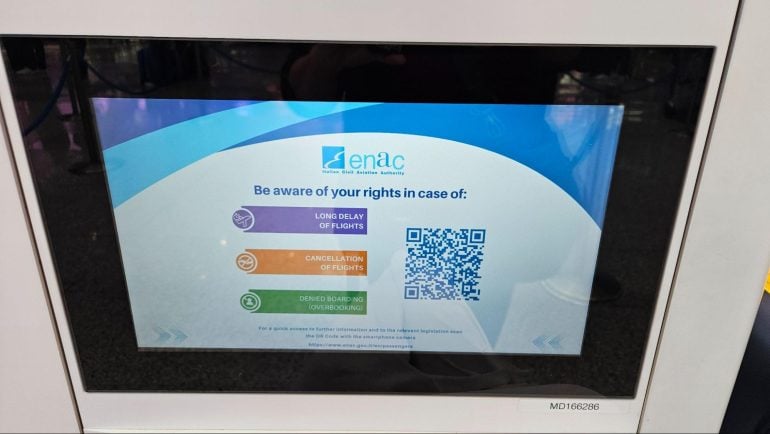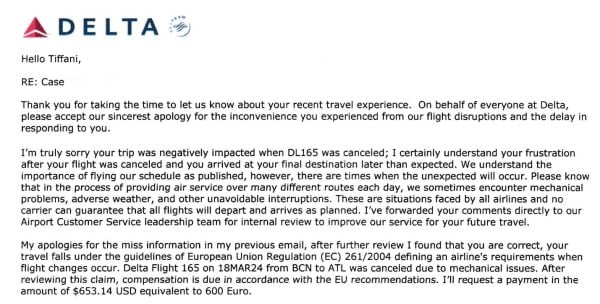How EU 261 Compensation Works for Flight Problems
EU law protects flyers with care and compensation for flight delays or cancellations (up to $650).

Many or all of the products on this page are from partners who compensate us when you click to or take an action on their website, but this does not influence our evaluations or ratings. Our opinions are our own.
It may sound like another boring piece of legislation, but Regulation (EC) No 261/2004 of the European Parliament and of the Council of the European Union, also known as EU 261, might be a handy friend to have during flight disruptions in the European Union.
EU 261 outlines air passenger compensation rights if a flight is canceled or delayed, or you’re denied boarding, on certain flights headed to or from the EU.
Here’s what you need to know about EU 261 and how to get paid if it applies.
What is EU 261/2004?
The Air Passengers Rights Regulation 2004 became binding law in EU member states on Feb. 17, 2005, to establish common rules about assistance and compensation for airline passengers who have a canceled or delayed flight or who are denied boarding involuntarily.
EU 261 specifically outlines when airlines need to notify passengers about a delay or cancellation, how to compensate passengers in these circumstances, and how the airline needs to take care of affected travelers with non-financial amenities like food and lodging.
Get the 'Cheat Codes' to Cheaper Travel
Unlocking the secret to saving a ton on travel is easier than you think. 📤 Our free newsletter shows you how in 5 min. or less.

When does EU 261 apply?
In short: EU 261 kicks in if the trip disruption is within the airline's control, you're flying on an eligible carrier in the EU and you're a qualifying passenger who hasn't received other protections.
Who is at fault for the flight interruption?
To qualify, the cancellation or delay must have been something within the airline’s control, like mechanical issues, staffing problems, etc. If extraordinary circumstances that the airline could not have anticipated cause the delay, it is not covered.
Weather and air traffic control issues are likely not covered by EU 261.
Where is the flight, and who is operating it?
Eligible flights must depart from the EU, operate wholly within the EU or be EU-bound and operated by an EU-based air carrier. Flights bound for the EU from non-EU nations on airlines that are not EU-based do not qualify.
There are 27 member nations of the EU.
EU member countries
- Austria.
- Belgium.
- Bulgaria.
- Croatia.
- Republic of Cyprus.
- Czech Republic.
- Denmark.
- Estonia.
- Finland.
- France.
- Germany.
- Greece.
- Hungary.
- Ireland.
- Italy.
- Latvia.
- Lithuania.
- Luxembourg.
- Malta.
- Netherlands.
- Poland.
- Portugal.
- Romania.
- Slovakia.
- Slovenia.
- Spain.
- Sweden.
EU 261 also applies to flights headed to or from Guadeloupe, French Guiana, Martinique, Réunion Island, Mayotte, Saint-Martin (French Antilles), the Azores, Madeira and the Canary Islands (but not the Faroe Islands), as well as flights to and from Iceland, Norway and Switzerland.

So, breaking it down further, if you’re:
- On an Air France flight between Paris and Athens, Greece, EU 261 would apply because the flight is operated by an EU airline and is operating within the EU.
- On a KLM Royal Dutch Airlines flight from New York City to Amsterdam, The Netherlands, EU 261 would apply because KLM is an EU airline despite the flight departing from a non-EU country.
- On a Delta Air Lines flight from New York City to Amsterdam, The Netherlands, EU 261 would not apply because even though the flight is arriving into the EU, Delta is not an EU-based airline.
- On the reverse route, a Delta flight from Amsterdam, The Netherlands, to New York City, EU 261 would apply because the flight is leaving from the EU, and in that situation, EU and non-EU airlines are subject to EU 261.
Are you an eligible passenger?
In addition to what issue is causing the delay, where the flight operates and who operates it, only certain passengers qualify.
You're eligible for compensation under EU 261 if:
- You have a confirmed reservation on a flight and have checked in for the flight by the time the airline requires or, if there isn’t a specific time, at least 45 minutes before the published departure time.
- You have been transferred to a flight by another air carrier.
- You are traveling on a paid fare that is available to the public to purchase or on a frequent flyer ticket or award ticket. Passengers on a free or reduced fare ticket that is not available to the public are not eligible.
As well, only passengers who haven't already received benefits for flight-related problems under the relevant laws of a non-EU country are eligible.
Understanding qualifying airlines
EU 261 defines an eligible EU carrier as an airline with a valid operating license granted by an EU member state. Example EU-based airlines include Lufthansa, British Airways and Turkish Airlines, as well as budget carriers like Ryanair.
This matters as there are instances when you may buy a ticket on one airline and because of a codeshare agreement, another airline actually operates the flight.
For example, when looking at flights between New York-John F. Kennedy and Amsterdam on Delta’s website, some flights are operated by Delta (an airline based and licensed in the United States) and others are operated by KLM Royal Dutch Airlines (an airline based and licensed in The Netherlands, in the EU). This makes a difference as far as EU 261 is concerned.
So even though the flight was booked on Delta’s website and has a Delta flight number, EU 261 would apply to the flights KLM operates.
» Learn more: The best airline credit cards right now
What is the possible financial compensation outlined in EU 261?
The amount of compensation from EU 261 depends on several factors, including when the airline notifies you about the cancellation, the length of the delay and the physical distance of the flight.
🤓 Nerdy Tip
For the purposes of EU 261, the outbound and return flights are always considered as two separate flights, even if they were booked as part of one reservation. You would not be compensated for the full price of your ticket if only one flight was interrupted. Canceled flights
To qualify for compensation, the cancellation must happen less than 14 days before the scheduled departure date.
EU 261 compensation for cancellations is based on flight distance. You can expect:
- About $269 (250 euros) for flights of 932 miles (1,500 kilometers) or less.
- About $431 (400 euros) for flights within the EU of more than 932 miles (1,500 kilometers) and for all other flights between 932 and 2,175 miles (between 1,500 and 3,500 kilometers).
- About $646 (600 euros) for flights that do not fall under either of the other categories.
Some airlines offer Transportation Credit Vouchers (TCVs) instead of cash, sometimes at a higher value than the cash compensation.
Delayed flights
As for delays, the amount of compensation depends on both the length of the delay and the distance of the flight.
- About $269 (250 euros) for two-hour delays for flights of 932 miles (1,500 kilometers) or less.
- About $431 (400 euros) for three-hour delays for flights within the EU of more than 932 miles (1,500 kilometers) and for all other flights between 932 and 2,175 miles (between 1,500 and 3,500 kilometers).
- About $646 (600 euros) for four-hour delays or more for flights that do not fall under either of the other categories.
If the delay is at least five hours, passengers are eligible for reimbursement for the full price of the ticket if the trip is no longer relevant or for the parts they did not use.
If an airline re-routes a passenger and they arrive at their destination within a set amount of time (2 hours, 3 hours or 4 hours, depending on flight distance as outlined above), the compensation can be reduced by 50%.
» Learn more: How to get paid for airline delays
Non-financial amenities guaranteed by EU 261

In its “Right to Care” section, EU 261 outlines amenities beyond compensation that the airlines must provide affected passengers. Examples include meals, lodging and the chance to communicate travel changes with necessary parties, such as through phone or email.
The law states that airlines need to provide "meals and refreshments in a reasonable relation to the waiting time." It does not specify what food to provide or how long passengers must wait.

The airlines must also provide hotel accommodations and transportation to and from the hotel if an overnight stay is required.
As part of the accommodation requirement, airlines must also provide meals to passengers.

The airline must pay for affected passengers to make two phone calls and send necessary fax messages or emails.
Airlines must notify passengers about their rights outlined in EU 261
To make sure airlines tell passengers about their right to compensation, Article 14 of EU 261 requires airlines to provide notice about rules of compensation by posting information at check-in with this specific text.

This text reads: “If you are denied boarding or if your flight is canceled or delayed for at least two hours, ask at the check-in counter or boarding gate for the text stating your rights, particularly with regard to compensation and assistance.”
How to collect EU 261 compensation
Each airline handles compensation claims differently, and compensation claims cannot be made or paid at the airport.

For example, a Delta handout said to contact Customer Care via the website and instructed passengers exactly where to do so.
I followed the instructions for submission and received notice from the airline within a few weeks that my claim met EU 261 standards.

EU 261 specifies the compensation must be paid in cash or by electronic bank transfer, bank order or bank check. If a passenger agrees, the compensation may also be paid out in TCVs.
My notice from Delta informed me that I could get paid via either a direct deposit or a check.
🤓 Nerdy Tip
Make sure you keep copies or screenshots of all your boarding passes and communications from the airline. You might need to upload them when requesting compensation. Also, keep all receipts for any extras you had to purchase. EU 261 compensation recapped
EU 261 is a regulation of the EU that outlines what an airline must provide passengers in the event of a qualifying flight delay or cancellation. It applies to flights within the EU, flights out of the EU and some flights into the EU, depending on the carrier for trip interruptions within the carrier's control.
The maximum amount of compensation is about $646 (600 euro). Compensation depends on factors like the length of the flight and the length of the delay. Accommodations and meals are also generally provided.
Airlines must notify passengers of their rights, and passengers must apply for financial compensation since it is not automatic.
How to maximize your rewards
You want a travel credit card that prioritizes what’s important to you. Here are some of the best travel credit cards of 2026:
- Flexibility, point transfers and a large bonus: Chase Sapphire Preferred® Card
- No annual fee: Wells Fargo Autograph® Card
- Flat-rate travel rewards: Capital One Venture Rewards Credit Card
- Bonus travel rewards and high-end perks: Chase Sapphire Reserve®
- Luxury perks: American Express Platinum Card®
- Business travelers: Ink Business Preferred® Credit Card
Article sources
NerdWallet writers are subject matter authorities who use primary,
trustworthy sources to inform their work, including peer-reviewed
studies, government websites, academic research and interviews with
industry experts. All content is fact-checked for accuracy, timeliness
and relevance. You can learn more about NerdWallet's high
standards for journalism by reading our
editorial guidelines.
Limited Time Only: Earn $1,000 Toward Travel!
Capital One Venture Rewards Credit Card 
Travel

For a limited time, the
Capital One Venture Rewards Credit Card is offering new cardholders an especially rich bonus: Enjoy $250 to use on Capital One Travel in your first cardholder year, plus earn 75,000 bonus miles once you spend $4,000 on purchases within the first 3 months from account opening - that’s equal to $1,000 in travel!
More like this
Related articles








